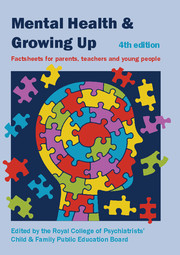Book contents
- Frontmatter
- Contents
- Contributors
- Factsheets for young people
- Factsheets for parents, carers and anyone who works with young people
- 1 Good parenting
- 2 The restless and excitable child
- 3 Dealing with tantrums
- 4 Children who soil or wet themselves
- 5 Sleep problems in childhood and adolescence
- 6 Behavioural problems and conduct disorder
- 7 Attention-deficit hyperactivity disorder (ADHD)
- 8 The child with general learning disability
- 9 Specific learning difficulties
- 10 Autism and Asperger syndrome
- 11 Depression in children
- 12 Worries and anxieties: helping children to cope
- 13 Divorce or separation of parents: the impact on children and adolescents
- 14 Death in the family: helping children to cope
- 15 The emotional cost of bullying
- 16 Traumatic stress in children
- 17 Domestic violence: its effects on children
- 18 Child abuse and neglect: the emotional effect
- 19 Drugs and alcohol: what parents need to know
- 20 Self-harm in young people
- 21 Psychosis
- 22 Schizophrenia
- 23 Bipolar disorder in children and adolescents
- 24 Obsessive–compulsive disorder in children and young people
- 25 Eating disorders in young people
- 26 Chronic physical illness: the effects on mental health
- 27 Medically unexplained physical symptoms
- 28 Chronic fatigue syndrome: helping your child get better
- 29 Parental mental illness: the problems for children
- 30 Who's who in CAMHS
3 - Dealing with tantrums
from Factsheets for parents, carers and anyone who works with young people
Published online by Cambridge University Press: 02 January 2018
- Frontmatter
- Contents
- Contributors
- Factsheets for young people
- Factsheets for parents, carers and anyone who works with young people
- 1 Good parenting
- 2 The restless and excitable child
- 3 Dealing with tantrums
- 4 Children who soil or wet themselves
- 5 Sleep problems in childhood and adolescence
- 6 Behavioural problems and conduct disorder
- 7 Attention-deficit hyperactivity disorder (ADHD)
- 8 The child with general learning disability
- 9 Specific learning difficulties
- 10 Autism and Asperger syndrome
- 11 Depression in children
- 12 Worries and anxieties: helping children to cope
- 13 Divorce or separation of parents: the impact on children and adolescents
- 14 Death in the family: helping children to cope
- 15 The emotional cost of bullying
- 16 Traumatic stress in children
- 17 Domestic violence: its effects on children
- 18 Child abuse and neglect: the emotional effect
- 19 Drugs and alcohol: what parents need to know
- 20 Self-harm in young people
- 21 Psychosis
- 22 Schizophrenia
- 23 Bipolar disorder in children and adolescents
- 24 Obsessive–compulsive disorder in children and young people
- 25 Eating disorders in young people
- 26 Chronic physical illness: the effects on mental health
- 27 Medically unexplained physical symptoms
- 28 Chronic fatigue syndrome: helping your child get better
- 29 Parental mental illness: the problems for children
- 30 Who's who in CAMHS
Summary
What causes a tantrum?
This is a normal part of growing up. Between the ages of 1 and 4 years, most children will have tantrums. As children grow they are learning to become more physically independent. For example, they may want to play, want to dress and feed themselves, or pour their own juice. Your child therefore can get very upset if they are unable to do something or if they are stopped. A battle between freedom and frustration can lead to tantrums.
Tantrums can also occur when a child is:
• tired
• hungry
• feeling ignored
• worried or anxious – a younger child may be unable to tell you that they are anxious and they may cry, become clingy and have tantrums.
What can I do when my child is having a tantrum?
Your child's screams and yells can be alarming. You may feel angry, discouraged and hopeless. You will almost certainly be embarrassed if a tantrum occurs in a public place or in front of other people.
It is not easy being a parent or carer of a toddler. However, it is important to set the rules, so your child learns to deal with their emotions. Remember, it is only natural that children will try to push the limits. Here are some ideas which may work for you and your child.
• Don't panic The main thing to do is to stay calm and not to get upset. Just remind yourself that this is normal, that lots of parents do deal with it, be reassured that you will manage this too.
• Ignore the tantrum You should calmly continue with whatever you are doing – chatting to someone else, packing your shopping or whatever. Every so often check to make sure your child is safe. Ignoring your child is very hard, but if you answer back, or even smack them, you are giving them the attention they are demanding.
• Be consistent with rules You are trying to teach your child that rules are important and that you will stick to them.
• Pay attention to any good behaviour As soon as you see any signs of calming down, e.g. they stop screaming, praise them.
- Type
- Chapter
- Information
- Mental Health and Growing UpFactsheets for Parents, Teachers and Young People, pp. 52 - 53Publisher: Royal College of PsychiatristsPrint publication year: 2013



